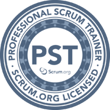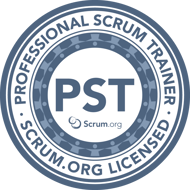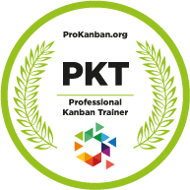Learning Objectives
Following the APS-SD course, you'll have learned how to perform the following:
- Experience real collaboration between Developers, Product Owner and Scrum Master in the quest of building and delivering a high quality and valuable product.
- Build and deliver working software by applying modern Agile engineering practices and supportive DevOps tools.
- Understand the synergy between the various elements of Scrum and complementary practices.
Topics
The APS-SD course is a blend of interactive exercises and instruction within a case study as you collaborate with other students through a series of Sprints:
- The Scrum Framework
- What is Scrum?
- The Scrum Guide.
- The Elements and Rules of Scrum.
- Complementary Practices.
- Case Study
- Exploring the Case Study Application.
- Creating a Definition of Done.
- Defining What Is and Isn’t a Bug.
- Reporting a Bug Effectively.
- Product Backlog Refinement
- The Evolution of a Product Backlog Item.
- Estimation Techniques.
- Release Planning.
- Sprint 1
- DevOps
- What is DevOps?
- Learning about the Three Ways.
- Understanding and Overcoming Common Challenges.
- DevOps and Scrum.
- Quality Software
- Testing in the Real World.
- Improving Quality Related Metrics.
- Key Test Types.
- Tools and Strategies.
- Sprint 2
- Emergent Architecture
- Software Architecture and Software Design.
- Reducing Risk.
- When to Make Decisions?
- How Much Up-Front Work?
- Software Architecture in a Scrum Context.
- Deciding and Validating Software Architecture.
- Architecture and Quality Goals.
- Quality Code
- Developing and Coding.
- Ensuring High Quality Code.
- Coding Principles, Patterns and Practices.
- Quality Code = Quality Software.
- Clean Code.
- Test-Driven Development (TDD).
- Build Automation.
- Continuous Integration and Feedback.
- Technical Debt.
- Sprint 3
- Scrum Challenges
- Overcoming Scrum Challenges and Development Team Dysfunctions.
- Becoming a High-Performance Scrum Team.
Who Should Attend?
Anyone working on or with a Scrum Team. This course is especially well suited to individuals or teams considering Scrum, beginning to utilize Scrum or currently struggling with Scrum.
Scrum.org Certification

After completing an Applying Professional Scrum for Software Development class, you'll receive a password to attempt the PSD I assessment and earn the industry-recognized PSD I Certification. Your password never expires, however should you attempt the PSD I assessment within 14 days after receiving your password and not receive a passing score, you'll be granted a 2nd attempt for no additional fee.
Earning your PSD I Certification makes you part of an elite community of 22,000+ PSD I badge holders from around the globe and unlike other Scrum training and certification organizations, your certification never expires and will not require future renewal fees.
Students of Scrum.org's Applying Professional Scrum for Software Development classes are entitled to a 40% discount on the Professional Scrum Master I (PSM I) assessment once earning their PSD I.
Public and Private Training
Please visit our public training schedule to find our upcoming public APS-SD classes.
Interested in private on-site or Live Virtual Training? If so, private classes are available with group discounts! Please contact us at training@madisonhenry.com or 844.BE.AGILE so we can discuss your needs.
PMI PDU Credits
APS-SD students are able to claim Project Management Institute (PMI) PDU credit: 21 PDUs. Please note that PMI PDUs are earned for course attendance and not for earning a PSD I Certification. Students can claim PDUs under PMI’s "Education courses provided by other third party providers” category. You can claim your PDUs here.
About Scrum.org
Scrum.org is the home of Scrum, leading the evolution and maturity of Scrum to improve the profession of software development.
In addition to defining industry-leading Scrum training for practitioners at all levels, Scrum.org provides all of the tools and resources needed by Scrum practitioners to deliver value using Scrum. It hosts the Scrum Guide in 30 languages, provides assessments to allow people to evaluate themselves and improve and hosts community blogs, forums and resources to foster discussion and knowledge transfer.
Why Train with Scrum.org?
-
Scrum Leadership – Scrum.org is led by the co-creator of Scrum, Ken Schwaber.
-
Scrum Guide Alignment – Scrum.org's training is aligned with the Scrum Guide that is published and maintained by Scrum co-creators Ken Schwaber and Jeff Sutherland.
-
Consistent Quality – Scrum.org has developed and regularly enhances 1 body of content for each of its courses in collaboration with Scrum.org's 300+ global Professional Scrum Trainer to help ensure consistency and high quality. Scrum.org's approach of integrating lectures with team-based case studies and interactive exercises helps enable a great learning experience and preparation to begin effectively applying Scrum.
-
Meaningful Certifications – Scrum.org's Assessment & Certification Program includes rigorous assessments with the opportunity to examine your knowledge of Scrum, earn highly respected certifications and be recognized on Scrum.org. And unlike other Scrum training and certification organizations, your certification will never expire nor require future renewal fees.examine your knowledge of Scrum, earn highly respected certifications and be recognized on Scrum.org.
About Madison Henry 

The Madison Henry Group helps clients realize the benefits of agile software development and pursue organizational agility.
Founded in 2005, Madison Henry enables high performance and optimizes the value delivered by complex software through three lines of professional services: Agile Transformation with coaching and consulting across the enterprise; Training & Certification in partnership with industry leaders such as Scrum.org, Applying Professional Kanban and Scaled Agile (SAFe); and Staff Augmentation.
We are passionate about our work. We value insight, commitment and innovation. We maintain an unwavering pledge to client success and satisfaction. for the key roles of Scrum Masters, Scrum Developers and Kanban Delivery Managers.








